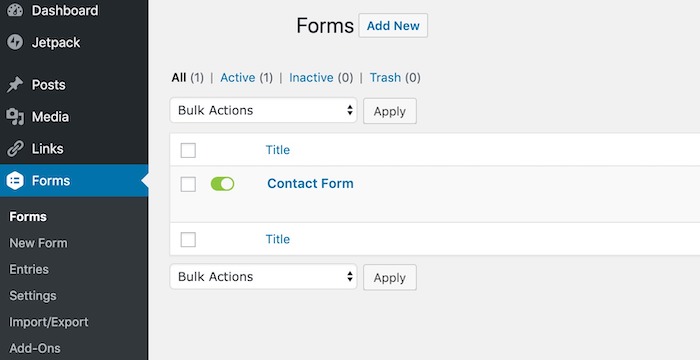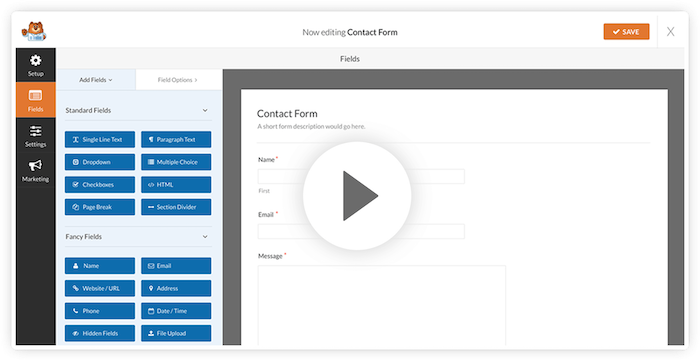24 Things Your WordPress Form Plugin Can Do Besides Create A Contact Form

When most people think of a WordPress form plugin, they do so in the context of a contact form — they have built a WordPress website or blog, they’re building out the pages, and they need a form solution so they can add a contact form to the contact page. You may have even done the same thing.
But did you know that WordPress form plugins can be used for a whole bunch of things other than a contact form?
Forms are tools for gathering information. They are an essential part of the web’s two-way conversation. The content on your site talks to visitors; forms let visitors talk back to you.

Forms also allow WordPress site owners to structure the information that visitors provide in a way that email or social media chats cannot. A well-designed form ensures that visitors enter the information the site owner needs in a format that can be usefully stored and processed.
Furthermore, the information entered into WordPress forms doesn’t have to stay in WordPress.
Many WordPress form plugins are integrated with external applications such as spreadsheets and customer relationship management applications. Form data can be automatically transferred to these applications for analysis or action.
In short, whenever a WordPress site owner needs to gather information from visitors, a form is the right tool.
Many WordPress form plugins like Jotform WordPress Forms, WPForms, Gravity Forms, Ninja Forms, Formidable Forms, and Caldera Forms have free versions that do more than you think and premium versions that deliver even more features.

Additional Basic Form Uses
If there is something you need to collect information for, a web form can help facilitate it with ease. The free versions of the WordPress plugins listed above can be used to create forms for all sorts of things like a:
- New project inquiry form
- Quote request form
- Speaker booking form
- Author appearance request form
- Customer feedback form
- Ask a question form
- New student registration form
- Sponsorship request form
- Volunteer recruitment form
- A job application
- Visitor submissions form
- Guest blog post submission form
- Speaker application form
As you can see, WordPress forms can be used anywhere a business needs to collect information that can’t be collected automatically. In the past, a business website might have provided a telephone number to call. Sales and support staff would then gather the relevant information over the phone — an expensive and time-consuming process.
By augmenting a business site with WordPress forms, a huge variety of information can be collected without consuming the time of a valuable employee.
Premium Web Form Use Cases
There may be times when you need to do something more complex with a web form — something that requires a third-party integration or more advanced content collection and processing features. In these cases, you can pay to upgrade your WordPress form plugin to the premium version to access it’s extended features and add-ons.
This will give you the ability to do things such as:
- Create a newsletter sign up form and connect it to your email marketing provider
- Build a webinar registration form and automatically add new participants to your email list
- Create an event sign up form and provide event details
- Build a simple payment form or order form to sell a product on your website
- Add an interactive survey to your WordPress site
- Create an interactive quiz, poll, or assessment that delivers users customized results
- Build a custom calculator
- Add an inquiry form to your service’s website that uses conditional logic to tailor the questions asked to the specific service the visitor is interested in
- Architect a buying decision helper form
- Provide documents for approvals and online signatures
- Create a donation form for your non-profit
As you can see, WordPress form plugins can be used for so much more than a basic contact form and we have only scraped the surface of what’s possible. The more advanced features of form plugins focus on integration and conditional logic.
Information is often most useful when it can be automatically processed and acted on by an external application. Email addresses are good to have, but it’s even better when they can be automatically added to a custom mailing list based on the information in the form submission.
Conditional logic can turn a form into a conversation. The form presents custom questions based on previous responses, which allows the system to collect relevant information, to present useful information based on the responses, and to categorize site visitors according to fine-grained criteria.
Now, the questions I have for you are:
- What else can you do with the form plugin installed on your website?
- How can you leverage software already installed on your WordPress site to automate business processes and reduce your workload?
What about you?
How are you using forms on your WordPress site? Have a cool form you built that you want to show off? We’d love to hear your thoughts.
About the author
Jessica Frick is Liquid Web’s Product Manager for our Managed WordPress offerings. When she’s not obsessing about all things digital, you can find her enjoying quality time with her family, binging a sci-fi series, or brewing some iced tea.


